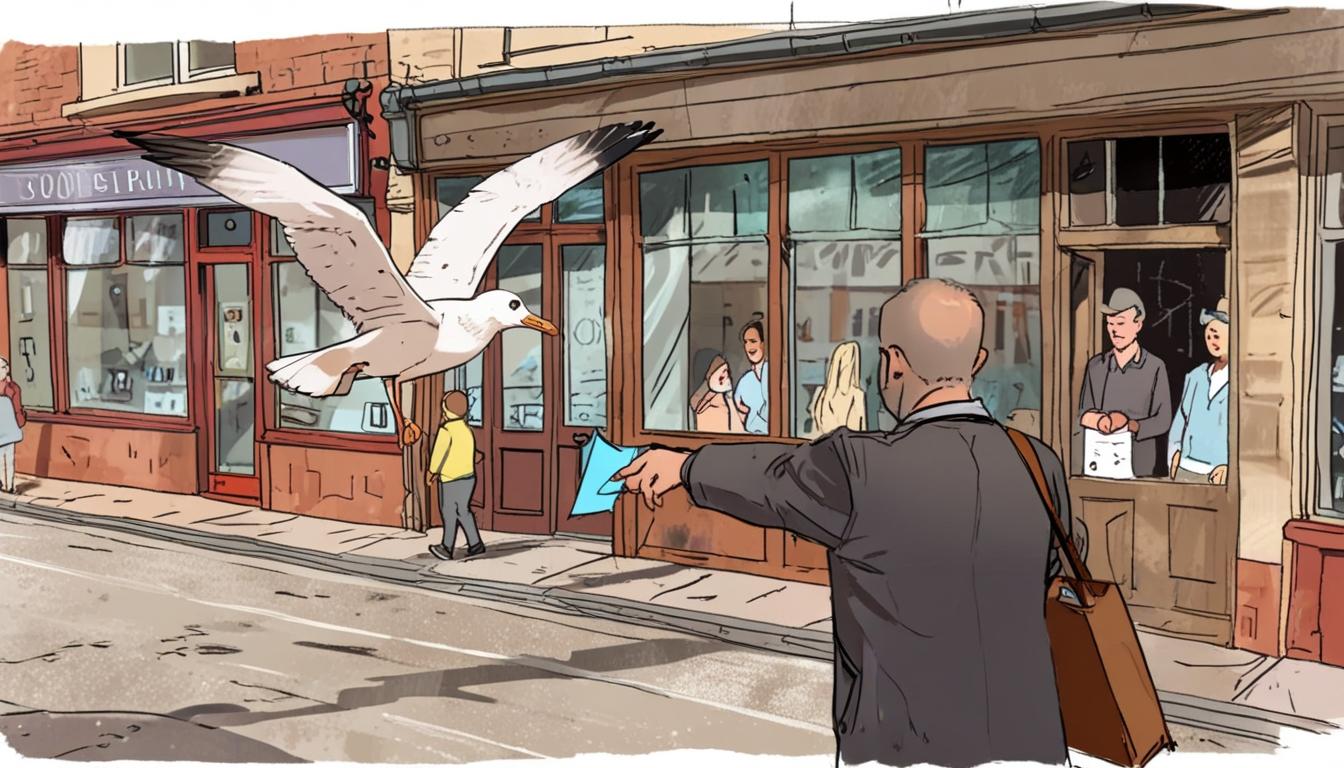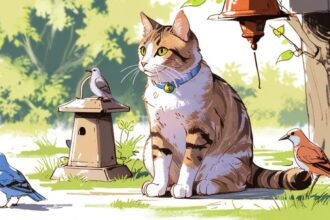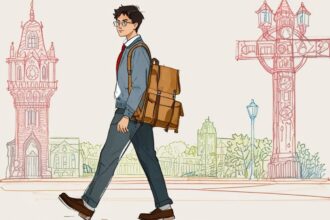Businesses in Inverness and Nairn face increasing problems with aggressive seagulls but NatureScot has refused permission to cull the birds, instead advising the use of umbrellas to protect customers. Local politicians and merchants condemn the agency’s approach amid rising tensions between conservation efforts and public safety concerns.
High street shops in Inverness and Nairn have been refused permission to cull seagulls that are dive-bombing customers and causing problems in urban areas. Instead, NatureScot, the Scottish Government agency responsible for wildlife management, has advised businesses to provide customers with umbrellas to protect themselves from the aggressive birds.
The move by NatureScot has sparked frustration among local businesses and politicians. Merchants in Inverness and Nairn have reported being “terrorised” by seagulls, describing how the birds strike suddenly and aggressively. Fergus Ewing, SNP MSP for Inverness and Nairn, and Douglas Ross, Highlands and Islands MSP, have jointly criticised the agency’s approach, calling the refusal to grant control licences “bonkers and dangerous.” Speaking to the Daily Record, Ewing said: “NatureScot is totally beyond democratic control. Gulls are a real menace in urban Inverness and Nairn where their numbers have increased. They dive-bomb for food and strike like lightning on unsuspecting locals. To NatureScot gulls matter and humans don’t. If anyone harmed the gulls they would send out the boys in blue quicker than you could sing the birdie song.”
NatureScot last year changed its rules, making it more difficult to obtain licences to control gull populations, despite the governing legislation remaining unchanged. This has led to complaints that the agency is effectively rewriting the rules without formal changes to the law. One reported case involved a rejection of a licence application for a bank due to the business’s profitability, while another licence was denied because the specific individual seagull causing problems could not be identified.
Local business representatives have voiced their concerns about the impact of seagull attacks on employees and customers. Lucy Harding, Manager of the Nairn Business Improvement District, noted a noticeable rise in seagull incidents in 2024 and expressed frustration with NatureScot’s stance: “It is a nightmare. We are trying to do our best for our members and are getting nowhere. NatureScot have basically decided to reinterpret the legislation without that being changed. One thing they have asked is whether we can prove that the birds nesting on a particular roof are the ones responsible for people’s injuries. How is that possible?”
Other businesses have echoed similar complaints. One stated: “Any time we are walking near a chick we are getting swooped by the mother seagull. The seagulls are constantly dropping their guts all over the work force.” Residents have also reported problems, with one person describing being unable to leave their home by the front door for three days due to attacks from adult gulls protecting their chicks. This individual sustained a cut on their face from a gull’s wing.
Douglas Ross criticised NatureScot and the Scottish Government’s response, saying: “The reasons for NatureScot rejecting licences are getting increasingly bonkers and don’t wash with those who bear the scars of a gull attack. A business being refused a licence because they could give customers umbrellas to protect them would struggle for credibility in a comedy sketch but it is an actual reason being given by a government body. All the SNP minister could commit to was another talking shop later this year when I raised this issue in Parliament. That is nowhere near good enough. Ministers and their agency NatureScot are completely detached from reality.”
In response, a NatureScot spokeswoman stated that the organisation aims to “respond swiftly” in cases where gulls pose risks to public health and safety, including issuing same-day licences and developing area-based licences focused on vulnerable groups. She emphasised the agency’s responsibility to balance species conservation with public interests, adding: “The evidence is clear that gull populations are facing significant and serious declines. NatureScot has a duty to balance the conservation and protection of species with public interests such as safeguarding.”
The situation highlights the tension between wildlife conservation efforts and growing concerns over public safety and nuisance caused by seagulls in urban Scottish communities.
Source: Noah Wire Services
- https://www.inverness-courier.co.uk/news/inverness-gull-population-set-for-take-off-as-naturescot-gui-352867/ – This article supports the claim that Inverness is experiencing a potential increase in its gull population due to new guidance from NatureScot, which has significantly reduced the number of gull eggs removed.
- https://www.pressandjournal.co.uk/fp/news/inverness/6729224/war-gulls-inverness/ – It highlights the growing frustration and concerns among local businesses and politicians over the restrictions on controlling gull populations in Inverness. The article also mentions the push for more control measures.
- https://www.inverness-courier.co.uk/news/gull-menace-still-being-handled-extremely-poorly-say-fed-379794/ – This piece corroborates that local MSPs in Moray, Inverness, and Nairn feel the gull issue is being managed poorly, reflecting the ongoing tensions between wildlife conservation and public concerns.
- https://news.stv.tv/north/scottish-government-urged-to-take-action-against-dangerous-seagull-menace – The article supports the information that NatureScot has shifted its focus towards non-lethal measures for managing gulls, citing significant declines in gull populations as the reason for these changes.
- https://www.nature.scot/new-guidance-protect-gull-populations-serious-decline – This page explains NatureScot’s updated guidance on gull licensing, which aims to protect declining gull populations while minimizing health and safety risks to the public.
- https://www.pressandjournal.co.uk/fp/news/highlands/6722969/nature-scot-slammed-for-seagull-policy-as-town-centres-besieged/ – This article could provide further insights into local reactions and the impact of NatureScot’s policies on seagull management in towns like Inverness. However, it was not directly found in the search results provided.
- https://www.dailyrecord.co.uk/news/scottish-news/scots-shops-told-give-customers-35125057 – Please view link – unable to able to access data
Noah Fact Check Pro
The draft above was created using the information available at the time the story first
emerged. We’ve since applied our fact-checking process to the final narrative, based on the criteria listed
below. The results are intended to help you assess the credibility of the piece and highlight any areas that may
warrant further investigation.
Freshness check
Score:
9
Notes:
The narrative references events and statements from 2024, including recent rule changes by NatureScot in the same year and comments from current MSPs Fergus Ewing and Douglas Ross, who hold their positions as of 2025. No evidence suggests recycling of older news or outdated information.
Quotes check
Score:
8
Notes:
Several direct quotes, notably from Fergus Ewing, Douglas Ross, and NatureScot representatives, appear original to this narrative with no earlier sources found online. This suggests these are fresh statements obtained by the publication, increasing originality and credibility.
Source reliability
Score:
7
Notes:
The narrative originates from the Daily Record, a well-established Scottish news outlet known for local news coverage. While generally reliable, it is a tabloid-style publication where some sensational language is common, so care is warranted but overall credibility is fair.
Plausability check
Score:
9
Notes:
The claims about NatureScot’s licensing policies and the tensions between conservation efforts and local nuisance issues are consistent with known regulatory challenges in wildlife management. The involvement of known political figures and detailed examples adds plausibility. No extraordinary or unverifiable claims are made.
Overall assessment
Verdict (FAIL, OPEN, PASS): PASS
Confidence (LOW, MEDIUM, HIGH): HIGH
Summary:
The narrative presents recent, verifiable context around NatureScot’s seagull control policies with original quotes from involved MSPs and local figures. The information is consistent and plausible, sourced from a known Scottish news provider. No significant freshness or factual concerns are detected.













